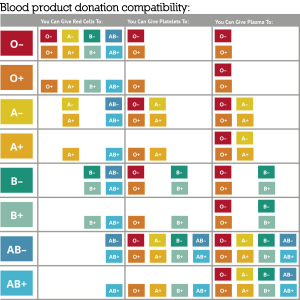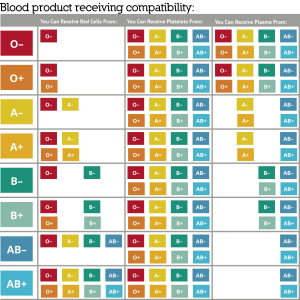Blood Drives at UCF
Help us maintain a safe and ready blood supply for cancer patients, trauma patients or for when unexpected tragedies occur.
Blood drives are regularly hosted on UCF campus in partnership with OneBlood.
Blood Donor Basics
Blood is essential to life. Blood circulates through our body and delivers essential substances like oxygen and nutrients to the body’s cells. It also transports metabolic waste products away from those same cells. There is no substitute for blood. It cannot be made or manufactured. Generous blood donors are the only source of blood for patients in need of a blood transfusion.
There are four basic components that comprise human blood: plasma, red blood cells, white blood cells and platelets.
Target Your Type

Your blood type is inherited and everyone’s blood type falls into one of eight types: O+, O-, A+, A-, B+, B-, AB+, or AB-. Each blood type holds a unique power to save lives.
Blood type matters when it comes to blood transfusions, as there are very specific ways in which blood types and blood components must be matched for a safe transfusion. OneBlood’s exclusive Target Your Type® program shows donors how to give the most needed components of their blood by targeting how they donate.


Whole Blood Donation
Whole blood donation is what most people are familiar with and allows us to draw a pint of blood containing red blood cells, white blood cells, platelets and plasma at one time.
People with the following blood types should consider donating Whole Blood:

Why Blood Is Needed
The reason to donate is simple…it helps save lives. In fact, every two seconds of every day, someone needs blood. Since blood cannot be manufactured outside the body and has a limited shelf life, the supply must constantly be replenished by generous blood donors.
Blood donors play a vital role in the healthcare of patients in your community. 37% of the population is eligible to donate blood, yet only 5% actually do. With every blood donation, you are providing strength, hope and courage to patients and their families in your local hospitals.
There are many reasons patients need blood. A common misunderstanding about blood usage is that accident victims are the patients who use the most blood. Actually, people needing the most blood include those:
- Being treated for cancer
- Undergoing orthopedic surgeries
- Undergoing cardiovascular surgeries
- Being treated for inherited blood disorders
Frequently Asked Questions
Can I donate blood?
To donate blood, you must be in good health, 16 years of age (16-year-olds need a completed and signed Parental Consent Form) or older, and weigh a minimum of 110 lbs.
How much blood is taken during a blood donation?
A whole blood donation is typically one pint of blood.
How long does the actual blood donation process take?
Whole blood donation takes about 10 – 15 minutes. Automated procedures can take anywhere from 45 minutes to 90 minutes.
Is there anything I should do before I donate blood?
- Drink plenty of water prior to donating.
- Eat a light healthy meal. Avoid fatty foods. Donating blood on an empty stomach is not recommended.
- Eat iron-rich foods a few days leading up to your blood donation. Your iron levels must be at a certain level in order to donate blood, and they will be checked prior to your blood donation. If they are too low, you will not be able to donate blood that day.
What should I bring when I donate blood?
- Wear comfortable clothing, preferably with a short-sleeve shirt
- Bring your ID and a list of any medications you are taking
- If you are 16, you’ll need a signed parental consent form.
Is there anything I should do after donating?
- Drink plenty of water
- Avoid alcohol for 24 hours
- Avoid lifting heavy items and rigorous exercise for the remainder of the day
What is my donated blood tested for?
After donating, a sample of your blood will be sent to OneBlood’s state-of-the-art testing facility. Your blood type will be determined and multiple tests will be performed to ensure your blood is safe for transfusion. Tests performed include:
- Red blood cell antibody screen
- Hepatitis B
- Hepatitis C
- HIV 1/2
- HTLV I/II
- Syphilis
- Cholesterol
- West Nile Virus
- Cruzi (Chagas)
Certain donations may also be tested for:
- CMV (Cytomegalovirus)
- HLA antibody screen
For more information about the basics of blood donation, visit OneBlood’s website at https://oneblood.org.
